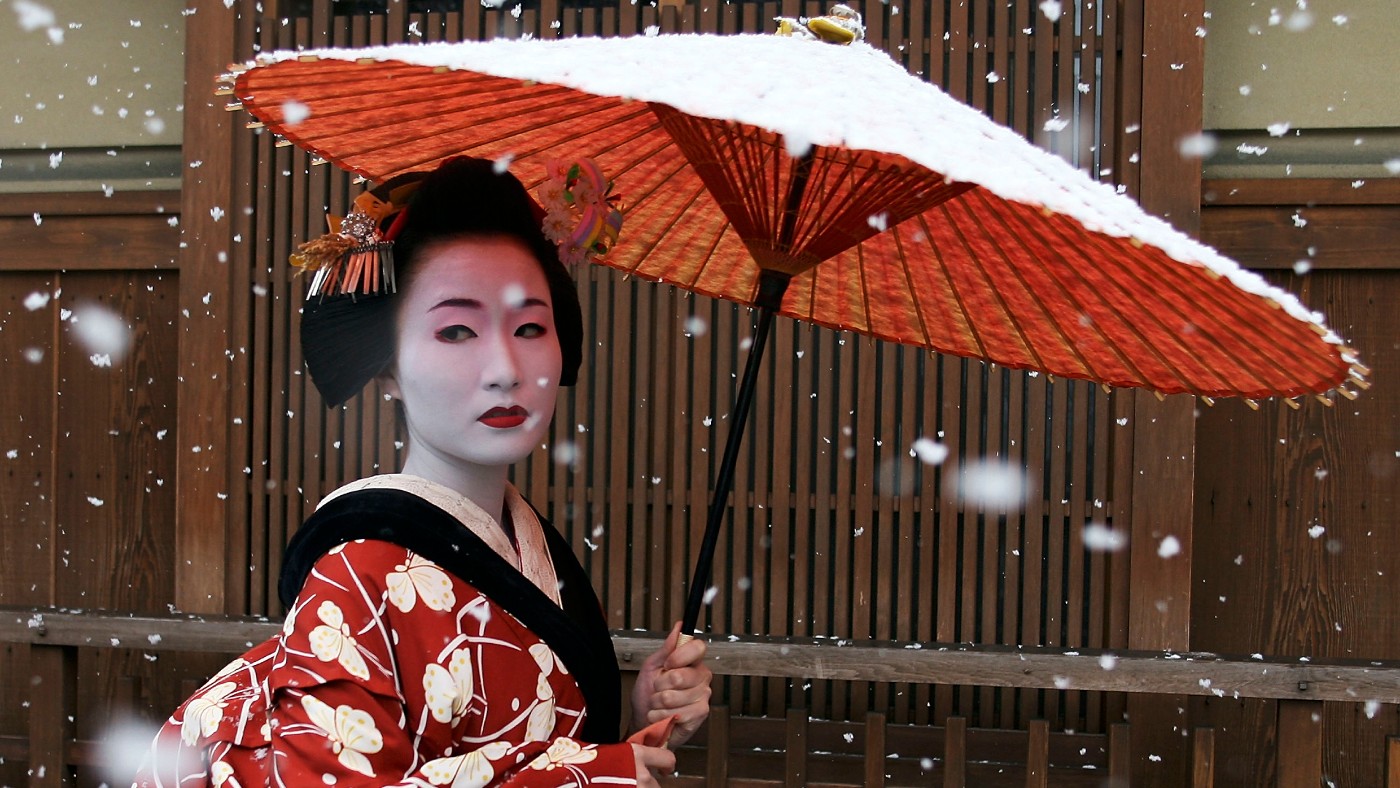Geisha paparazzi: Kyoto's biggest headache
Tensions over tourists taking photographs of iconic Japanese women have reached 'boiling point'

A free daily email with the biggest news stories of the day – and the best features from TheWeek.com
You are now subscribed
Your newsletter sign-up was successful
With a history dating back to the 1700s, geishas are one of Japan's most enduring cultural images.
But this has increasingly made them a tourist attraction, and the "throngs" of visitors who are try to snap photos of them in "picturesque streets" have been compared to the paparazzi for their aggressive tactics, said CNN.
'The pretty painted face of Japanese patriarchy'
The Japanese word "geisha" literally means "art person". They are traditional Japanese female entertainers who are skilled in arts such as classical music and dance, and playing the samisen (an instrument like a lute). They entertain customers while they dine and drink.
The Week
Escape your echo chamber. Get the facts behind the news, plus analysis from multiple perspectives.

Sign up for The Week's Free Newsletters
From our morning news briefing to a weekly Good News Newsletter, get the best of The Week delivered directly to your inbox.
From our morning news briefing to a weekly Good News Newsletter, get the best of The Week delivered directly to your inbox.
Geishas wear a kimono and the way their obi (sash) is tied signals their status. With their distinctive white face, red lips and elaborately decorated hairstyle, the geisha has become a recognisable image around the world. Apprentice geishas are known as maikos.
Geishas are not immune from controversy. Writing in The Observer in 2001, Barbara Ellen argued that the geisha "is, and has always been, the pretty painted face of Japanese patriarchy". And "no amount of waffle" about "things that make ignorant, sensation-greedy Westerners go weak at the knees" has been able to disguise the "ethical fungus at the heart of geisha culture".
There was controversy in 2015 when Katy Perry dressed up as a geisha for her performance at the American Music Awards. It was dismissed as a "yellowface" performance, said The Guardian.
There has also been controversy over a growing trend of tourists following them around to take photographs. In 2015, Kyoto published pamphlets and other handouts that used pictograms to illustrate travel "nuisance activities", including taking photos of geishas and maikos.
A free daily email with the biggest news stories of the day – and the best features from TheWeek.com
But four years later, said CNN, tensions had reached "boiling point" amid reports of tourists tugging at women's kimonos, chasing them around with cameras and smartphones, pulling out their hair ornaments and even hitting them with cigarette butts.
Although Gion, the area of Kyoto where most geishas live and work, has begun posting signs and notices prohibiting photography, and warning that violators would face a fine, Isokazu Ota, from the Gion's South Side District Council, said the tourism "paparazzi" have "gotten more brazen" since the return of mass tourism to Japan after the pandemic.
'People know the rules but are ignoring them'
The problem of tourists surrounding geishas and their maiko apprentices "arose before the pandemic" and will be "trickier to solve", said The Times. Amid growing concern, the local council in Gion hopes to make narrow alleys completely closed off to tourists by April 2024. But photography on the main thoroughfare of Gion, Hanamikoji, cannot be banned since it is a public street.
It's hoped that visitors can still meet and interact with maikos and geishas. The Gion Theatre, which is located off Hanamikoji, hosts performances by maikos, after which audience members can have their pictures taken with the women in an organised and respectful context.
"The people taking pictures of the streets of Gion on the main street and the tourists taking pictures of maiko from afar are probably unaware of the rule against photography," said Ota.
However, he added, "the foreign tourists waiting for maiko to come out in the alleys of Gion’s photography-prohibited areas know the rules but are ignoring them", so "even if we warn tourists, it is difficult to get through to them at this point".
Chas Newkey-Burden has been part of The Week Digital team for more than a decade and a journalist for 25 years, starting out on the irreverent football weekly 90 Minutes, before moving to lifestyle magazines Loaded and Attitude. He was a columnist for The Big Issue and landed a world exclusive with David Beckham that became the weekly magazine’s bestselling issue. He now writes regularly for The Guardian, The Telegraph, The Independent, Metro, FourFourTwo and the i new site. He is also the author of a number of non-fiction books.
-
 Why is the Trump administration talking about ‘Western civilization’?
Why is the Trump administration talking about ‘Western civilization’?Talking Points Rubio says Europe, US bonded by religion and ancestry
-
 Quentin Deranque: a student’s death energizes the French far right
Quentin Deranque: a student’s death energizes the French far rightIN THE SPOTLIGHT Reactions to the violent killing of an ultraconservative activist offer a glimpse at the culture wars roiling France ahead of next year’s elections
-
 Secured vs. unsecured loans: how do they differ and which is better?
Secured vs. unsecured loans: how do they differ and which is better?the explainer They are distinguished by the level of risk and the inclusion of collateral
-
 Microdramas are booming
Microdramas are boomingUnder the radar Scroll to watch a whole movie
-
 A thrilling foodie city in northern Japan
A thrilling foodie city in northern JapanThe Week Recommends The food scene here is ‘unspoilt’ and ‘fun’
-
 Samurai: a ‘blockbuster’ display of Japan’s legendary warriors
Samurai: a ‘blockbuster’ display of Japan’s legendary warriorsThe Week Recommends British Museum show offers a ‘scintillating journey’ through ‘a world of gore, power and artistic beauty’
-
 The 8 best superhero movies of all time
The 8 best superhero movies of all timethe week recommends A genre that now dominates studio filmmaking once struggled to get anyone to take it seriously
-
 Josh D’Amaro: the theme park guru taking over Disney
Josh D’Amaro: the theme park guru taking over DisneyIn the Spotlight D’Amaro has worked for the Mouse House for 27 years
-
 Nepal’s fake mountain rescue fraud
Nepal’s fake mountain rescue fraudUnder The Radar Arrests made in alleged $20 million insurance racket
-
 The best fan fiction that went mainstream
The best fan fiction that went mainstreamThe Week Recommends Fan fiction websites are a treasure trove of future darlings of publishing
-
 In Okinawa, experience the more tranquil side of Japan
In Okinawa, experience the more tranquil side of JapanThe Week Recommends Find serenity on land and in the sea